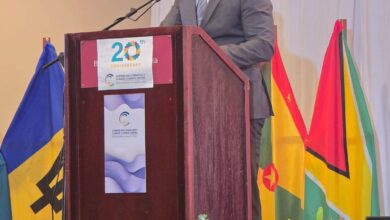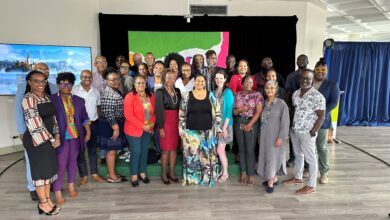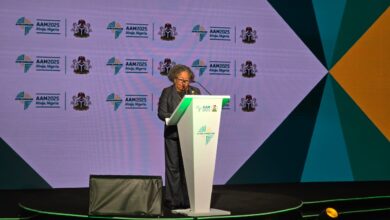Mr. Chairman;
Colleague Heads of Government;
Distinguished Members of the Legislative,
Judicial and Executive Authorities of Grenada;
Esteemed Secretary General of the Commonwealth;
Esteemed Secretary General of the Organisation of American States;
Excellencies of the Diplomatic Corps;
Distinguished Delegates;
Specially Invited Guests;
Ladies and Gentlemen;
Brothers and Sisters:
Prime Minister Mitchell and the Grenadian people have succeeded in making the Antigua and Barbuda delegation feel more than being welcome guests, we are family too, and that we are “at home” here in the Spice Island. Our hosts have obviously put special efforts into the organization of this Conference and have made superb arrangements for our work and our comfort. I am confident that every delegation in this assembly will endorse these sentiments.
Ladies and Gentlemen:
I would like to take this opportunity to thank those of my colleague Heads of Government who recognise the unique challenges my infant Government faces, and who have volunteered technical support to help move Antigua and Barbuda forward. I must also take the opportunity to record my appreciation for the cooperation, for the wise counsel, and for the generous support that our esteemed Secretary General has extended during my brief tenure as Chairman of the Conference of Heads of the Community.
As you well know, ladies and gentlemen, there is no means of preparation for a first time Prime Minister who finds himself Chairman of the Conference of Heads of the Community the very moment he takes his oath of office. When a novitiate Prime Minister is immediately faced with the unconstitutional removal of the democratically elected President of a member state, his obvious and his only option is to declare, as I did: Thank God for PJ Patterson!
Thank you, again, Prime Minister Patterson.
Ladies and Gentlemen:
Paradoxically, and very regrettably, a “No Admittance to Opposition Politicians” sign continues to hang over the door to the councils of CARICOM, and to CARICOM’s counsel. Fortunately, our esteemed Secretary General is always-on-duty as mentor and midwife to first-timers like me.
I must confide that my already high esteem for our Secretary General grew immensely on my recent visit to CARICOM Headquarters in Georgetown. I was not prepared for the constraints under which our Secretariat and our Secretary General are required to function. That these men and women are able to turn in the sterling performances that they so routinely deliver is telling testimony to the character and the calibre of CARICOM’s headquarters team, and of its leadership.
We who operate on CARICOM’s upper deck have a deep obligation to the team that runs the CARICOM engine room in Georgetown. Though less than adequately equipped, and though inadequately rewarded, they continue to keep the “SS CARICOM” securely on course. I invite you to join me in applauding our committed headquarters crew.
Colleagues Heads of Government of the Community:
I come to my first CARICOM Summit with expectations tempered by the recognition of reality. I am, nonetheless, optimistic that this meeting will constructively engage the question of governance in the region, boldly determine the restructuring of the Secretariat, and set generous rewards for CARICOM’s officers. I am equally optimistic that over the coming days, pending issues relating to the Single Market will be successfully negotiated.
Not all issues, however, will lend themselves to ready resolution.
A current Single Market concern that could not have been predicted is the threat to our societies of the alarming influx of seasoned criminals deported from the United States and the United Kingdom. Some of those deportees have spent virtual lifetimes in the exporting countries. Now, as in recent years, they are being deposited in societies in which they have only the most tenuous family connections; if any at all. They enter our communities in a state of alienation.
Jamaica is fortunate to have pre-empted a recent wave of hundreds of such deportees from the UK. Once again, Prime Minister Patterson has demonstrated why he is the Grandmaster among us.
These unexpected and unwelcome deportees, and the Caribbean Court of Justice, are CARICOM issues that West Indians readily grasp.
On both issues, the dominant response of large numbers of Caribbean people is fear. Our societies are fearful that the unchecked movement of criminal deportees across CARICOM borders will be an unwelcome and immediate outcome of a full fledged Single Market.
Against this fear, there is limited public comprehension or conviction of the potential benefits that the Single Market will bring to our societies. Jamaica’s determination of constitutional issues related to the Caribbean Court of Justice is encouraging, and is to be applauded.
I must, however, caution this meeting that in other member states, my own country included, the jury is still out on the Caribbean Court of Justice. Three landmark Privy Council decisions, all arising from constitutional motions, leave lingering doubts in large numbers of the Antigua and Barbuda population about the wisdom of abandoning what many see as “The protection of the Privy Council”. Each of those three Privy Council judgments found that unanimous decisions of our Court of Appeal were fatally flawed.
Many Antiguans and Barbudans, perhaps a majority of my compatriots, see these judgments as definitive cases against transfer of final appellate jurisdiction to the Caribbean Court of Justice. Quite candidly, I am yet to be persuaded that the Government of Antigua and Barbuda can avoid formal action to achieve national consensus on the issue of the Caribbean Court of Justice. It could well be that in seeking national consensus on the Caribbean Court of Justice certain Caribbean Governments might have to venture into relatively uncharted waters in their relationships with Opposition leadership in the Region.
It is a pity that CARICOM has not yet sought to make itself a pasture in which the Region’s political lambs and lions could lie down together. Think of how wonderful that would be.
Ladies and Gentlemen:
At this meeting, we will be launching Radio CARICOM and considering a wider communications thrust that is the most ambitious ever undertaken by the community. Long overdue, this is a most welcome development. I urge colleagues to give consideration to maximum use of the Internet in these communications efforts. Moreover, I urge colleagues to consider means by which CARICOM can assist in reducing the digital divide between its member states and the developed nations. Any initiative in this area will be of immense benefit to the people of our region.
As we consider options for ensuring enduring benefits for our societies, we must give profound thought to the factors that underpin development strategies in tourism-driven economies in our Region. In a number of member states, our principal development strategy consists, essentially, of extended tax holidays – for a quarter of a century in some cases – and the virtual giveaway of prime assets that are among the most coveted anywhere in the world, our incomparable Caribbean beach fronts. Fire sale prices for prized beachfronts and the abolition of virtually all import duties can hardly be the best foundation for sustainable development.
Even as our region records continuing growth in visitor arrivals, tourism revenue and Gross Domestic Product, many of our economies, Antigua and Barbuda’s included, are in serious trouble.
Clearly, an examination of these factors and some measure of cohesion in investment incentives could be of immeasurable benefit to all member states.
It strikes me that related to all of this, there is urgent need for rationalisation of intra-Caribbean air services. Certain member states pay significant subsidies to international air carriers. At the same time, they resolutely deflect similar support to LIAT, which lay claim to being “The Caribbean Airline” with greater legitimacy than every other air carrier.
With all of this, ladies and gentlemen, there continues to exist the unfathomable anomaly that Tourism, the sector that drives most Caribbean economies, is not even on the Agenda for this CARICOM Summit. Tourism may, of course, be subsumed in various agenda items over the next three days. Still, the Caribbean’s major provider of jobs and revenues should be an automatic candidate for permanent listing on the Agenda of every CARICOM Summit.
Of urgent necessity, energy is down for discussion at this meeting. I have a particular interest in this issue.
Antigua and Barbuda is locked into an agreement with a sole fuel supplier that amounts to a monopoly that spans several decades. On this topic, I must record my personal appreciation and my country’s gratitude for Prime Minister Manning’s demonstrated commitment to providing non oil producing member states with some measure of relief.
In this sense, Trinidad and Tobago is not only a good neighbour. Prime Minister Manning’s policies have made his country a protective bigger brother to other member states.
Ladies and Gentlemen:
I must seize this opportunity to extend sincere good wishes to my colleague Heads of Government whose countries are in competition for selection for the remaining seven venues for World Cup Cricket, 2007.
Ladies and Gentlemen:
On that convivial note, I wish to conclude by thanking you for your generous indulgence.
May God bless every one of you.
May God bless all our nations.
Top





